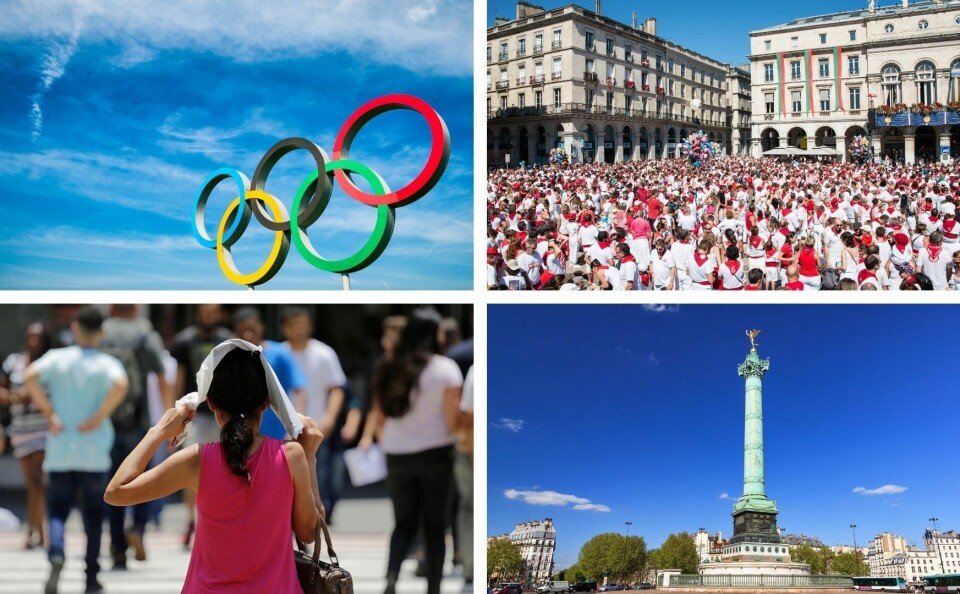-
Pension age reform in France: New poll shows support for a return to age 62
Employers' organisations and trade unions are currently meeting to discuss the subject on the orders of Prime Minister François Bayrou
-
Mystery of jewels found buried under communal wall in Dordogne
The gold rings, pearl brooches and diamond encrusted bracelets were discovered by a local association
-
Try a different way to cross UK-France the Channel - a sailing catamaran ferry
Passengers will be able to help sail the boat once out of the harbour
What’s coming up? The week ahead in France
The Tour de France Femmes picks up pace and the Fêtes de Bayonne returns after two years of Covid-related disruption. We also explain a date for history buffs

Heatwave continues in south-east France
There are 13 departments in southeastern France still on an orange canicule alert today (July 25), as the heatwave which has already moved over the rest of the country continues in this area.
The departments are: Alpes-de-Haute-Provence, Hautes-Alpes, Alpes-Maritimes, Ardèche, Bouches-du-Rhône, Drôme, Gard, Hérault, Isère, Savoie, Haute-Savoie, Var and Vaucluse.
National forecaster Météo France states that the heatwave’s temperatures are rising, with highs “flirting with 40C within Provence.
It predicts that places under the orange warning will see temperatures of 35-38C today in general.
The orange alert is expected to last until 06:00 tomorrow at the earliest; a “noticeable” drop in temperatures is then expected.
Read more: Orange heatwave alert maintained for south-east France
Gironde fires under control
The two wildfires which have been raging across Gironde (Nouvelle-Aquitaine) since July 12 are now “under control”, according to the department’s prefecture.
Read more: GRAPHS: See how recent French wildfires compare to previous years
The fires, which began in La Teste-de-Buch near the Dune du Pilat and in Landiras to the south of Bordeaux, collectively burnt around 21,000 hectares of land, and caused the evacuation of 36,750 people.
All evacuated residents and holidaymakers can now gradually begin to return.
“We can describe these two fires as exceptional. Exceptional because they were very difficult to control, exceptional because they began at a time when weather conditions were also out of the ordinary,” Gironde’s prefect Fabienne Buccio said.
“The risk of new fires starting is not out of the question,” she added.
Ms Buccio has previously said that it will be a few weeks before the fires are completely extinguished so firefighters will continue to work at the scene this week.
The Fêtes de Bayonne begin
This year marks the 90th anniversary of the first Fêtes de Bayonne, France’s largest festival, which combines musical and street performances, dances, parades and firework displays.
After two years of disruption caused by the Covid pandemic, the festival is returning this year on Wednesday (July 27), when the Foulée du festayre race will take place.
There will also be a concert to mark the official start of the Fêtes, complete with an opening ceremony at 21:50 and a ball at 22:30.
Thursday will be a day for the festival’s children, with musical performances, Basque choirs and parades moving through the streets.
The festival will come to an end on Sunday, with church services, concerts and a closing ceremony with fireworks.
The Tour de France Femmes gets underway
After the Danish rider Jonas Vingegaard won the men’s Tour de France for the first time yesterday (July 24), it is now the women’s turn to compete.
💛🇩🇰 Jonas Vingegaard wins the #TDF2022!
— Tour de France™ (@LeTour) July 24, 2022
💛🇩🇰 Jonas Vingegaard remporte le #TDF2022 ! pic.twitter.com/QTd4ipsxNH
The racers also began yesterday, with a route around Paris won by Dutch cyclist Lorena Wiebes.
Today (July 25), the riders will complete a 136.4-kilometre-long stage linking Meaux to Provins (Seine-et-Marne).
The largely flat route will be a moment for the Tour’s best sprinters to gain a head start.
French television will be following the race this afternoon, with the riders expected to arrive in Provins at 16:15.
The week of the Trois Glorieuses
Nearly 200 years ago, this week saw the second French Revolution, which is also known as the July Revolution or the Trois Glorieuses.
Between July 26 and July 29, 1830, the people of Paris clashed with the army, with protestors capturing several of the city’s most important sites, including the Louvre Palace and Hôtel de Ville.
The riots led to the abdication of King Charles X on August 2, when his son the Dauphin also renounced his right to the throne and both fled over the Channel to Great Britain.
Politicians created a provisional government and put Charles’ cousin Louis Philippe, Duke of Orléans, on the throne.
Louis Philippe would himself be overthrown 18 years later.
The Trois Glorieuses are commemorated by the July Column, which sits in the Place de la Bastille in Paris.
Paris Olympics summit takes place
Two years ahead of the start of the 2024 Olympic Games, President Emmanuel Macron will be holding a meeting with around ten other ministers today to discuss the progress of preparations.
There have been some concerns that the Paris authorities will not be equipped to handle the logistical and safety requirements of the Games, especially after the chaotic scenes which took place outside the Stade de France during the Champions League football final in May.
Read more: Stade de France chaos an ‘inevitable fiasco’ says French Senate
Read more: Change Olympic opening plans, warns Paris football final investigator
This meeting will be a chance for ministers to “update” the government on preparations for the event, as well as outlining “weak points”.
As well as security concerns, these “weak points” include budgetary strain linked to the current high inflation rate.
Related articles
Spending power, judges, Jean Castex: This week in French politics
Coronavirus: Daily updates on the situation in France
























